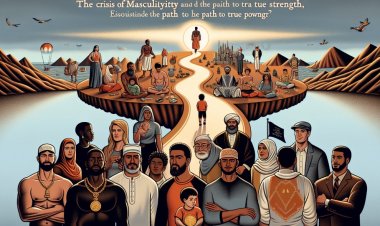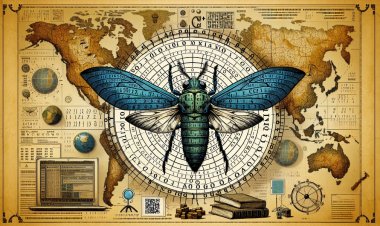Is Science Coming to an End?
Final frontier or curtain call? Dive into the debate surrounding the potential end of science, exploring arguments for and against its limitations. Is there still a universe of knowledge unexplored, or are we nearing the boundaries of the knowable? Engage in the mind-bending quest for answers.

Let's go on an adventure to see if something could happen!
Lately, I've been thinking about something: is science going to stop? Sometimes, people might think I sound like a crazy scientist when I talk about my worries. But I don't think my concerns are actually that crazy. Sometimes people might think it's a silly idea, but I think it's important to talk about why science might stop in the future and if it's happening now. Today, we're going to explore and learn about that topic.
In 1996, a person named John Horgan wrote a book called "The End of Science." In this book, he said that science had come to a point where it couldn't move forward anymore. He thought that there wouldn't be any new discoveries or progress in science. This person became the top enemy of scientists because they didn't like what he said in his popular book. Scientists didn't like it because they thought it would mean the end of their jobs. They especially didn't like it because they get paid with money from people who buy those books.
But Horgan is someone who doesn't give up easily. In 2016, which was 20 years after the book was first published, the author added a new introduction at the beginning of the book. In this introduction, he said that based on what he observed, he believed that his ideas in the book were correct.
Horgan is saying that he doesn't think we will make any more big discoveries in science like we did with heliocentrism, evolution, quantum mechanics, relativity, or the Big Bang. He doesn't mean that we will stop doing science completely, just that we won't have any more really important breakthroughs. Yes, he was correct, wasn't he? Physics is a subject that helps us understand how things in the world work. It looks at things like how objects move, why things fall down, and how light and sound travel. By studying physics, we can learn more about the way our world You know how sometimes we have really important questions that we don't know the answers to?
Well, there are some really big questions that people had 40 years ago that we still don't know the answers to today. It's like those questions are still a mystery and we're still trying to figure them out.
We still don't understand what dark matter is, how to measure gravity, or how the universe started. And this is also true in all other areas of science. Scientists are still trying to figure out how life started on Earth, like how the first living things came to be. They're also trying to understand what consciousness is, which is the ability to think and be aware of things. Becoming immortal means living forever, and scientists are studying ways to make that happen. And as for why socks sometimes go missing in washing machines, well, that's still a mystery that scientists are trying to solve too!
Even though I host a science show and write a science newsletter, I actually agree with Horgan, even though it might seem surprising. Someone else asked the question before him. In John Barrow's book "The Book of Nothing," I read about this concept. Barrow made a really convincing argument that made a lot of sense. He says that knowing about how nature works can either have a limit or go on forever.
Either we will learn all the things we can possibly know, or we won't. If we keep learning and understanding more and more things, science will never stop. There's always more to discover! But if we only have a certain amount of knowledge or if we can only understand so much, there will come a point where we can't learn or understand anymore. Sometimes, there are things that we don't know that we don't know. This means that there could be important information that we haven't discovered yet. Because of this, there might come a time when science can't find any more new things to learn. The question is asking about the specific time something happened or will happen.
Sometimes, when people say "we," it can be unclear who exactly they are talking about. It's like when someone says "Let's go to the park," but you're not sure if they mean just you and them or a group of people. So, when someone says "we" and it's not clear, it means we need more information to understand who they are referring to. Do you know how sometimes science can be really complicated? Well, even if we try really hard, we might not understand everything about it. Especially if we spend a lot of time watching videos on YouTube instead of studying science. But "we" could mean that humans are changing into a different type of species.
Or, imagine if people had special devices implanted in their brains to help them think and do things better. Or, what if humans had robots or computers that could help them with tasks and make them smarter? Or, maybe in the future, people might even have extra brains that they can carry around with them in backpacks to help them think and learn more! No matter how much we try to learn new things, we still don't know if there's a point where we can't learn anymore.
Horgan's claim is more powerful or convincing than Barrow's claim. Barrow just said that science might stop happening. Horgan is saying that he believes we have already reached the end of something. Horgan says that humans went through a time when they were figuring out how nature works and made some important discoveries. But now, he thinks we're done with that phase and moving on to something else. Just like when people explore different places on Earth or learn about how our bodies work. Sometimes, there are special moments when people make really important discoveries.
Then that time is finished. That doesn't mean we're done learning about the human body, just like we're not done learning about other parts of nature. NASA, which is a space organization, is using lasers to take very accurate measurements of the Earth's surface. They are scanning the Earth and using the lasers to measure things like how tall or deep forests are, and even the small changes in how gravity pulls things towards the Earth. This helps them learn more about the Earth and its different parts.
But no one is going to find a brand new piece of land in the world. And we keep learning more about the human body, like how to fix parts that are broken, such as fixing nerves that have been hurt. But no one will discover an extra brain hiding beneath the left kneecap. The time when people made really important discoveries in those areas is finished for sure. And that makes us wonder: will science as a whole experience the same thing? Do we still find new natural laws like we did in the past? I think we should really think about that as a possible option.
But many scientists disagree with Horgan's idea, I think. And honestly, scientists who study how things work, like physicists, have good reasons to disagree with the idea that there will be no more new discoveries in science. That's because physics has many difficult questions that we still don't have answers to.
What about all the phenomena that scientists believe to be the result of "dark matter" in space? Is it like a tiny thing that we haven't found yet? Do we not understand gravity correctly? The things we know right now can't help us understand it, but it exists somewhere. So basically, there's a problem in science where we don't fully understand how gravity works when things get really, really tiny. Scientists have two theories, one by Einstein and one about tiny particles, but they don't fit together perfectly. The easiest way to understand why there must be a solution to this problem is that we don't know what happens to the gravitational field of a particle when it exists in two different places at the same time.
Einstein's theory, which is a set of ideas about how the universe works, is not able to explain or deal with that particular situation or problem. Well, you see, in quantum mechanics, there's this thing called the measurement problem. It's a bit tricky to understand, but I'll try to explain it to you. When we talk about measuring things in the quantum world, like particles, it's not as straightforward as measuring things in our everyday world. You know how when you measure something, you get a definite answer, like measuring the length of a pencil? In the quantum world Eventually, we will have to find a way to solve that problem. We need something that can tell us when a device has the right qualities to work as a detector. Horgan believes that there are some questions that we may never be able to find answers to.
I've studied and learned about all these different things, and I believe we can find solutions to them using the maths and technology we have right now. Maybe the other person is correct and I am incorrect. But wait, there's another reason why I don't think science is finished yet, and it doesn't have anything to do with physics. It's about a type of research called "complexity," which is all about studying chaos and complexity.
It's like when a butterfly flaps its wings and causes a big change somewhere else. And some systems can change and adapt on their own. In the 1980s, people talked a lot about chaos and complexity, but not a lot of important things happened because of it. So you might say, oh, Horgan is correct. Well, you see, sometimes when we want to understand something, we need to use maths. But in this case, the maths that we have right now isn't enough to help us make progress in our research. That's why we haven't gone very far yet. And there are really important discoveries that can happen once we figure out how to do the maths.
Physics is a branch of science that studies how things in the world work. It uses really advanced maths to understand and explain how things move and interact with each other. So, you could say that physics uses the fanciest maths out of all the sciences! But if you imagine looking at it from way up high like a bird, it's actually really simple. We can only solve certain math problems called linear differential equations. These problems involve equations with special rules that we can use to find the answers.
But really cool things that happen in nature, like chaos and complexity, need special math equations called nonlinear equations. And we don't know how to figure out the answers to these problems yet. Did you know that when we have really tricky maths problems called nonlinear differential equations, the best way to solve them is by guessing a solution and then checking if it's right? It might sound surprising, but this method has been proven to work really well!
Sometimes things go the way we want them to, and sometimes they don't.
So, you know how we can use computers to solve math problems? Well, one type of math problem is called a differential equation. It's a special kind of equation that involves rates of change. Nonlinear differential equations are a bit more complicated because they don't follow a straight line.
Now, in general relativity, which is a branch of physics, we use these nonlinear differential equations to understand how gravity works. We can use computers to solve these equations and get answers to you In simpler terms, the equations we're talking about are called the Einstein field equations. They're a special kind of equations that don't follow a straight line, which is why we call them "nonlinear". These equations are like math problems for a special kind of math called differential equations. They are called "nonlinear" because they have some tricky curves and shapes. The equations are used to describe something called the metric tensor, which is a way to measure distances and angles in space. So basically, these equations help us understand how things are measured in a special kind of math. In simple terms, the letter R represents a mathematical calculation called the curvature tensor.
It's a way to measure how curved something is. The sum part means that we're adding up different parts of the curvature to get a final result. The curvature tensor is a mathematical thing that helps us understand how space can be curved. It's made up of different parts that involve multiplying the metric (which tells us how distances work in space) with its derivatives (which are like the slopes of the metric). When we add up all these different parts, we get the curvature tensor. That means it doesn't follow a straight line or a predictable pattern. It can go in different directions and change in unexpected ways. These equations are not very nice to look at.
We can save them on a computer, but there's something that's not working correctly. Computers work with limited detail, like when you color in a picture using small squares. They also work with a set pattern, like a grid, to organize information. Lastly, computers process information in small chunks of time, like taking small steps to solve a problem. Yes, you can use something called adaptive meshing and other fancy techniques, but no matter what you do, computer simulations always depend on the idea that you can leave out or not pay too much attention to small details.
The thing is, when it comes to equations that are not straight lines, you can't solve them in the same way. The butterfly effect is a concept that says small actions can have big consequences. It's like when a butterfly flaps its wings, it can cause a chain reaction that eventually leads to something much bigger happening. So, even tiny things can make a really big difference! Imagine a tiny butterfly flapping its wings. Even though it's a small action, it can cause really big things to happen, like a huge tornado in Texas.
Yes, we can use a computer to put Einstein's equations into a program. But to be honest, we're not completely sure if the answers we get from the computer are right or not. It's like when we try to predict what the weather will be like in the future. We use climate models, which are like really complicated computer programs. But sometimes, these models have problems that are similar to the one we're talking about.
Yes, I understand that we're not supposed to talk about the problems with climate models, but I believe we should discuss them. Climate models are like big computer programs that scientists use to understand and predict what might happen with the weather and the oceans. One important part of these models is something called the Navier-Stokes equation. This equation helps scientists figure out how the air and water move around. By solving this equation, the models can give us a better idea of how the climate might change in the future.
That's a math problem called a nonlinear differential equation. It's a bit tricky because we don't know how to solve it yet. You know how sometimes there are really hard math problems that even the smartest mathematicians can't solve? Well, this problem is one of those! It's called a Millennium Prize problem, which means it's super important. So, when someone says "You don't have to take my word for it," they're basically saying that this problem is so difficult that you shouldn't just believe them without proof. Some people might want to make up a story that Sabine believes climate models are completely incorrect. But that's not true, right?
I didn't say what you think I said. I said that climate models have a hard time with some things, and one of those things is figuring out what happens on really small scales. Scientists who study the climate have made special tools to help them understand it better. One way they do this is by adding small, random changes to their calculations. These changes happen over a short period and help them get more accurate results. And that's a good thing because it helps us make a model that can predict things better. But when it comes to understanding maths, it's not very satisfying.
But let's talk about what happens when we reach the end of science. We don't have enough maths to understand systems that don't follow a straight line, systems that are very unpredictable, and systems that become very complicated. We don't really know exactly what complexity means. Right now, there is a big question in science that we don't have an answer to. This question is so important that it shows us that there is still a lot more for scientists to discover. We don't have a rule of nature that tells us how and when things become complicated. Some people have been trying to figure something out, and recently a few papers were published that tried to solve it. All of them use a way to measure how things become more complicated.
I don't really think any of these rules about how things become complicated are very convincing. But then again, I think a complicated problem is just saying no to a dinner invitation, so maybe I'm not the best person to ask about this. But for today's video, it doesn't really matter if any of these new rules about complexity are true or not.
The main idea is that scientists are trying to find a law that could be true. If they discover it, it would be a really exciting and important discovery. Imagine you're playing a game and there are lots of different situations that can happen. Understanding chaos and complexity means being able to figure out what might happen in each situation and how it could affect the game. It's like being really good at predicting what might happen next and making smart choices based on that. This can help you do better in the game and make a big difference in how well you do.
The stock market is like a big store where people buy and sell pieces of companies. Nuclear fusion is when scientists try to make energy by squishing atoms together. Society as a whole means all the people living together and following rules. The origin of life is how living things first started on Earth. Saying no to dinner invitations is when you don't want to go eat with someone and you tell them politely. It all depends on how things become more complicated. That means there is still so much more to learn about science.
We have only learned a little bit so far. We have been successful in studying really tiny things and really big things. Particle physics and cosmology are two branches of science that study really small things and really big things in the universe. They both use math to understand how things work. But when we try to understand things like how living things work, how we think and feel, how groups of people interact, and how our government works, we don't always have all the answers and formulas to figure it out.
Sure! So, there's this thing called the mesoscopic realm, which is like a middle ground between really tiny things and big things. When things get complex and chaotic in this realm, there might be some new laws of nature that we haven't discovered yet. And guess what? Artificial intelligence, which is like smart computer programs, might actually help us find these new laws!
But I still believe that there could come a time when we have discovered everything there is to know in science. Let me explain it to you in a way that's easy to understand.
Remember when we talked about Barrow's argument? Well, let's think about it again. There are two main reasons why science might stop being studied and explored. It could be because we have already found everything there is to find. And I just explained to you why I don't think that's true. But there's another reason, which means there is another explanation or cause for something. There could be more rules that govern how things work in nature, but sometimes we humans aren't smart enough to figure them out yet.
And when I say "dumb," I don't mean it in the way that someone can't do math or create a computer program to do it for us. Well, what the person is saying is that sometimes it's hard for scientists to work together and find solutions to problems because they don't have a good way of organising their research. It's like when you have a group project at school and everyone needs to work together, but it's difficult because you don't have a plan or a system to keep things organised.
It's funny, but the reason we struggle to organize science smartly is that we don't really understand complicated systems, to begin with. It's like trying to figure out which came first, the chicken or the egg. We can't understand complexity because scientific research is a really complicated system. To explain complexity, let's imagine you have two puzzles to solve. One puzzle is very simple and has only a few pieces, so it's easy to put together. The other puzzle is much more complicated and has many more pieces, making it harder to solve.
In the same way, complexity is a way to describe
Okay, let me explain it to you in a simpler way. You might be thinking, "I understand some parts of what you're saying, but not everything." Why is it important? It's important because we believe that science and technology can help us solve the problems we face. We trust that they can find solutions for us. There are some big problems in the world that we need to understand. One of them is called climate change, which means the Earth's weather is changing in a bad way because of pollution. Another problem is pandemics, which are when a lot of people get sick from a dangerous disease. Overpopulation is when there are too many people in one place, which can cause problems like not having enough resources for everyone. Poverty means that some people don't have enough money or the things they need to live a good life.
Lastly, sometimes we believe that if we have more science and better technology, it will solve our problems and help us out. What if the people don't do what they are supposed to do? Uh, oh, that's not good. Hey there! So, you're wondering if science is coming to an end, right? Well, science is actually a way for us to learn and understand the world around us. It's like a big adventure where scientists ask questions, do experiments, and discover new things. Science has been going on for a really long time, and it's not going to stop. If we don't give it enough attention, it might not stay alive.



 admin
admin 










